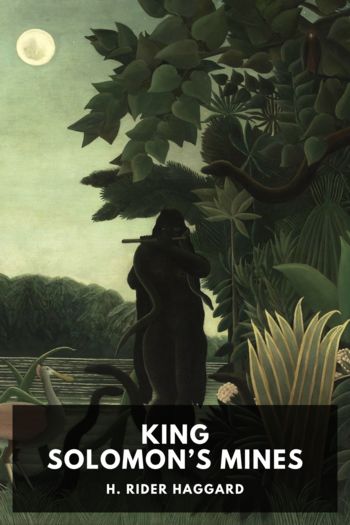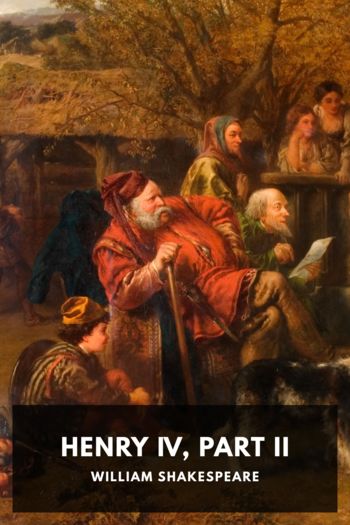King Solomon’s Mines - H. Rider Haggard (best life changing books .TXT) 📗

- Author: H. Rider Haggard
Book online «King Solomon’s Mines - H. Rider Haggard (best life changing books .TXT) 📗». Author H. Rider Haggard
As for Good and myself, the armour did not suit us nearly so well. To begin with, Good insisted upon keeping on his newfound trousers, and a stout, short gentleman with an eyeglass, and one half of his face shaved, arrayed in a mail shirt, carefully tucked into a very seedy pair of corduroys, looks more remarkable than imposing. In my case, the chain shirt being too big for me, I put it on over all my clothes, which caused it to bulge in a somewhat ungainly fashion. I discarded my trousers, however, retaining only my veldtschoons, having determined to go into battle with bare legs, in order to be the lighter for running, in case it became necessary to retire quickly. The mail coat, a spear, a shield, that I did not know how to use, a couple of tollas, a revolver, and a huge plume, which I pinned into the top of my shooting hat, in order to give a bloodthirsty finish to my appearance, completed my modest equipment. In addition to all these articles, of course we had our rifles, but as ammunition was scarce, and as they would be useless in case of a charge, we arranged that they should be carried behind us by bearers.
When at length we had equipped ourselves, we swallowed some food hastily, and then started out to see how things were going on. At one point in the tableland of the mountain, there was a little koppie of brown stone, which served the double purpose of headquarters and of a conning tower. Here we found Infadoos surrounded by his own regiment, the Greys, which was undoubtedly the finest in the Kukuana army, and the same that we had first seen at the outlying kraal. This regiment, now three thousand five hundred strong, was being held in reserve, and the men were lying down on the grass in companies, and watching the king’s forces creep out of Loo in long ant-like columns. There seemed to be no end to the length of these columns—three in all, and each of them numbering, as we judged, at least eleven or twelve thousand men.
As soon as they were clear of the town the regiments formed up. Then one body marched off to the right, one to the left, and the third came on slowly towards us.
“Ah,” said Infadoos, “they are going to attack us on three sides at once.”
This seemed rather serious news, for our position on the top of the mountain, which measured a mile and a half in circumference, being an extended one, it was important to us to concentrate our comparatively small defending force as much as possible. But since it was impossible for us to dictate in what way we should be assailed, we had to make the best of it, and accordingly sent orders to the various regiments to prepare to receive the separate onslaughts.
XIII The AttackSlowly, and without the slightest appearance of haste or excitement, the three columns crept on. When within about five hundred yards of us, the main or centre column halted at the root of a tongue of open plain which ran up into the hill, to give time to the other divisions to circumvent our position, which was shaped more or less in the form of a horseshoe, with its two points facing towards the town of Loo. The object of this manoeuvre was that the threefold assault should be delivered simultaneously.
“Oh, for a gatling!” groaned Good, as he contemplated the serried phalanxes beneath us. “I would clear that plain in twenty minutes.”
“We have not got one, so it is no use yearning for it; but suppose you try a shot, Quatermain,” said Sir Henry. “See how near you can go to that tall fellow who appears to be in command. Two to one you miss him, and an even sovereign, to be honestly paid if ever we get out of this, that you don’t drop the bullet within five yards.”
This piqued me, so, loading the express with solid ball, I waited till my friend walked some ten yards out from his force, in order to get a better view of our position, accompanied only by an orderly; then, lying down and resting the express on a rock, I covered him. The rifle, like all expresses, was only sighted to three hundred and fifty yards, so to allow for the drop in trajectory I took him halfway down the neck, which ought, I calculated, to find him in the chest. He stood quite still and gave me every opportunity, but whether it was the excitement or the wind, or the fact of the man being a long shot, I don’t know, but this was what happened. Getting dead on, as I thought, a fine sight, I pressed, and when the





Comments (0)